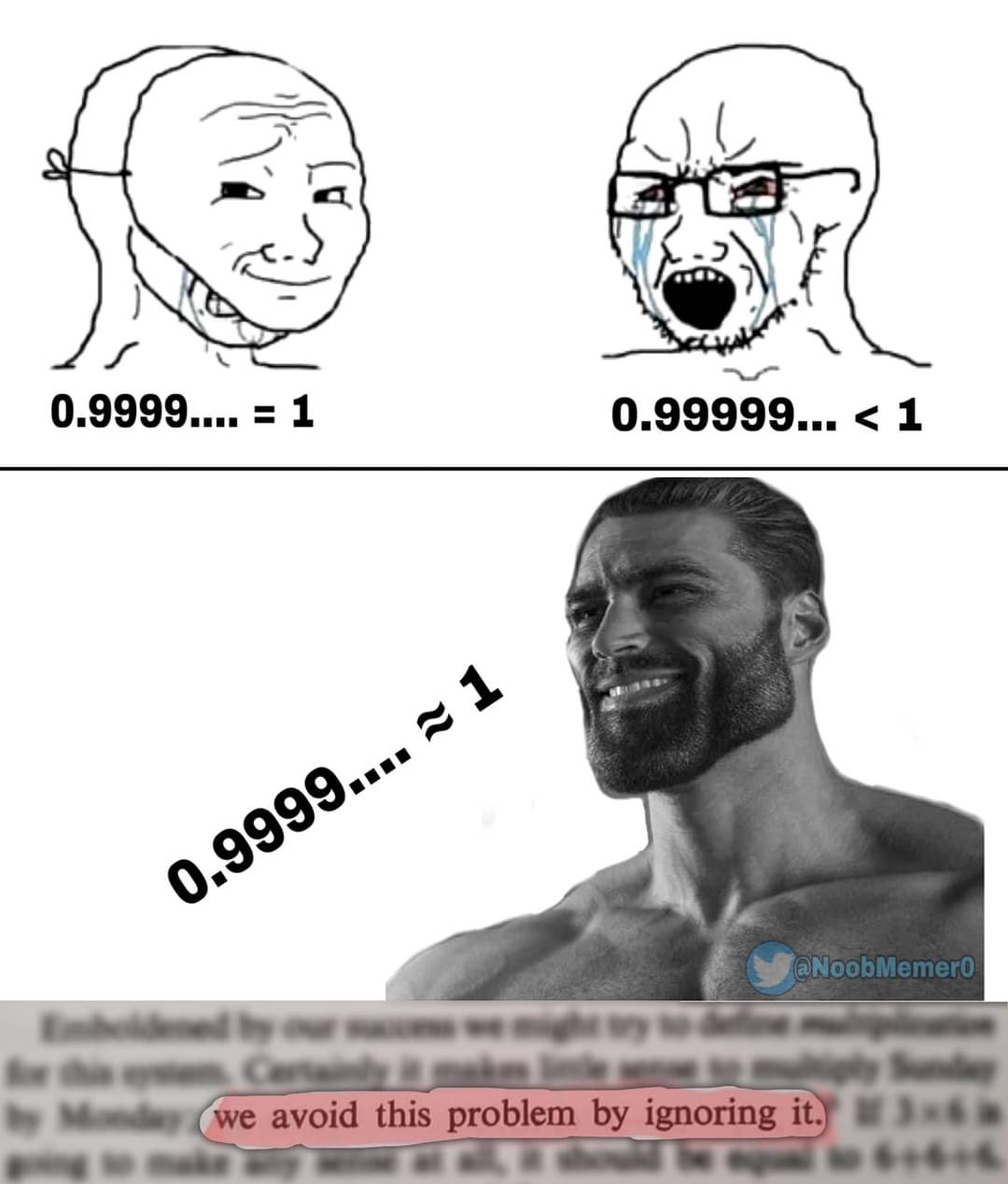this post was submitted on 27 Jun 2024
802 points (95.2% liked)
Science Memes
15738 readers
3051 users here now
Welcome to c/science_memes @ Mander.xyz!
A place for majestic STEMLORD peacocking, as well as memes about the realities of working in a lab.

Rules
- Don't throw mud. Behave like an intellectual and remember the human.
- Keep it rooted (on topic).
- No spam.
- Infographics welcome, get schooled.
This is a science community. We use the Dawkins definition of meme.
Research Committee
Other Mander Communities
Science and Research
Biology and Life Sciences
- !abiogenesis@mander.xyz
- !animal-behavior@mander.xyz
- !anthropology@mander.xyz
- !arachnology@mander.xyz
- !balconygardening@slrpnk.net
- !biodiversity@mander.xyz
- !biology@mander.xyz
- !biophysics@mander.xyz
- !botany@mander.xyz
- !ecology@mander.xyz
- !entomology@mander.xyz
- !fermentation@mander.xyz
- !herpetology@mander.xyz
- !houseplants@mander.xyz
- !medicine@mander.xyz
- !microscopy@mander.xyz
- !mycology@mander.xyz
- !nudibranchs@mander.xyz
- !nutrition@mander.xyz
- !palaeoecology@mander.xyz
- !palaeontology@mander.xyz
- !photosynthesis@mander.xyz
- !plantid@mander.xyz
- !plants@mander.xyz
- !reptiles and amphibians@mander.xyz
Physical Sciences
- !astronomy@mander.xyz
- !chemistry@mander.xyz
- !earthscience@mander.xyz
- !geography@mander.xyz
- !geospatial@mander.xyz
- !nuclear@mander.xyz
- !physics@mander.xyz
- !quantum-computing@mander.xyz
- !spectroscopy@mander.xyz
Humanities and Social Sciences
Practical and Applied Sciences
- !exercise-and sports-science@mander.xyz
- !gardening@mander.xyz
- !self sufficiency@mander.xyz
- !soilscience@slrpnk.net
- !terrariums@mander.xyz
- !timelapse@mander.xyz
Memes
Miscellaneous
founded 2 years ago
MODERATORS
you are viewing a single comment's thread
view the rest of the comments
view the rest of the comments

No, it equals 0.999...
2/9 = 0.222... 7/9 = 0.777...
0.222... + 0.777... = 0.999... 2/9 + 7/9 = 1
0.999... = 1
No, it equals 1.
Sure, when you start decoupling the numbers from their actual values. The only thing this proves is that the fraction-to-decimal conversion is inaccurate. Your floating points (and for that matter, our mathematical model) don't have enough precision to appropriately model what the value of 7/9 actually is. The variation is negligible though, and that's the core of this, is the variation off what it actually is is so small as to be insignificant and, really undefinable to us - but that doesn't actually matter in practice, so we just ignore it or convert it. But at the end of the day 0.999... does not equal 1. A number which is not 1 is not equal to 1. That would be absurd. We're just bad at converting fractions in our current mathematical understanding.
Edit: wow, this has proven HIGHLY unpopular, probably because it's apparently incorrect. See below for about a dozen people educating me on math I've never heard of. The "intuitive" explanation on the Wikipedia page for this makes zero sense to me largely because I don't understand how and why a repeating decimal can be considered a real number. But I'll leave that to the math nerds and shut my mouth on the subject.
It still equals 1, you can prove it without using fractions:
x = 0.999...
10x = 9.999...
10x = 9 + 0.999...
10x = 9 + x
9x = 9
x = 1
There's even a Wikipedia page on the subject
I hate this because you have to subtract .99999..... from 10. Which is just the same as saying 10 - .99999.... = 9
Which is the whole controversy but you made it complicated.
It would be better just to have them do the long subtraction
If they don't get it and keep trying to show you how you are wrong they will at least be out of your hair until forever.
You don't subtract from 10, but from 10x0.999.... I mean your statement is also true but it just proves the point further.
No, you do subtract from 9.999999....
Do that same math, but use .5555... instead of .9999...
Have you tried it? You get 0.555... which kinda proves the point does it not?
???
Not sure what you're aiming for. It proves that the setup works, I suppose.
x = 0.555...
10x = 5.555...
10x = 5 + 0.555...
10x = 5+x
9x = 5
x = 5/9
5/9 = 0.555...
So it shows that this approach will indeed provide a result for x that matches what x is supposed to be.
Hopefully it helped?